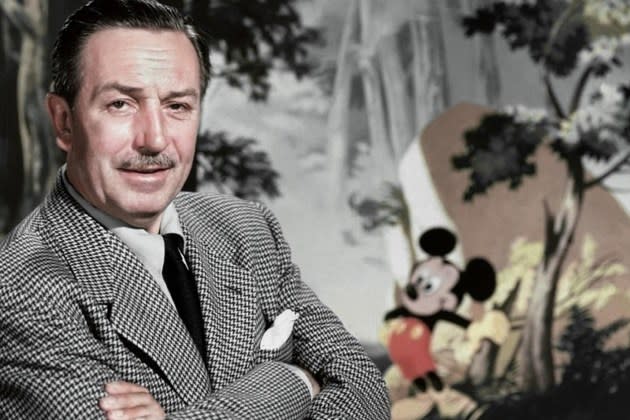Peter Bart: As Disney Celebrates Its Centennial, Old Walt Might Have Cringed At Some Recent Strategies

I think Walt would be grumpy.
This is the week when the media celebrates the Magic Kingdom’s 100th birthday, but Walt Disney were around today, I think he’d cringe at the state of guild negotiations, fights with politicians and jumps in theme park prices (or streamer fees).
More from Deadline
Having gained immortality for entertaining kids, he might still agonize about the major new commitment to sports betting made through ESPN, a Disney asset.
As one of the few people still around who actually spent time with the shy and media-averse studio pioneer, I found myself reflecting this week on those topics that Walt liked (and disliked) talking about.
I’m a fairly good note-taker, and as such I can report precisely what he was excited and angry about in December 1965 – one year before he died. Although he looked a bit weary and struggled with a chain-smoker’s cough, he had a lot on his mind beyond the studio.
Walt was delighted that Mary Poppins had become a hit — grossing about $30 million — but still was angry that, years earlier, he’d been talked into making Alice in Wonderland. “Idiots think whimsy can be easily translated to the screen,” he groused.
He resented being pressured to finance a movie based on Don Quixote, sensing that “we’d be crucified if that doesn’t turn out perfectly.” Walt complained that “we’ll do better with The Ugly Dachshund than trying to make classics.”
Movie budgets were growing too fast, Walt said, but the idea of selling TV rights to Poppins appalled him. “The movie will generate $7 million a year at the box office when it’s re-issued every seven years,” he predicted.
What was it like talking with Walt Disney? Some of his critics over the years have described him as a reactionary curmudgeon, even anti-Semitic. I never encountered those traits. He regretted backing Barry Goldwater for president in 1964, admitting, “My fling at politics simply wasn’t very interesting.”
My talks with Disney took place at Disneyland or at his commissary and were wide-ranging. At 64, he still was fiercely engaged in both spending and raising lots of money.
Some $80 million was targeted for a unique new CalArts campus in Santa Clarita, which would span animation, theater, dance and fashion, among other disciplines.
Then there was a vast plan for a new Alpine Village in the Sequoia National Park (he coveted new community designs like Epcot). There also were theme park expansions: a new Tomorrowland for Disneyland and, of course, development of a massive Disneyland East in Florida.
Far from being the dour Midwestern conservative, Disney was wide open to new ideas and adventures. He resented the distractions of all the honors and plaudits — his plaques, scrolls and statuettes were stashed in a corner of his studio office.
When asked why he had kept them, he said, “Who else would want the debris?”
I rarely talked or wrote about my encounters with Walt Disney over the years because I was reluctant to betray his views on sensitive topics. At the time, I was a young political reporter on The New York Times, and we would stray into issues of race and politics – conflicts that he found frustrating.
When he showed me around Disneyland, on the other hand, he candidly referred to it as his playpen; the fact that children also coveted his toys was amazing but irrelevant.
I would like to have asked Walt how he felt about Bob Iger’s decision, at age 71, to resume his corporate leadership. I suspect that Walt instinctively was an artist as much as an entrepreneur — one who preferred dreaming about new towns or ugly dachshunds than figuring out how to bring gambling to ESPN.
RELATED: Disney Unveils ESPN Financials As It Preps Standalone Sports Segment
Walt himself wasn’t always a careful negotiator. In 1927, he’d created Oswald the Lucky Rabbit and hammered out 25 cartoons before realizing he hadn’t tied up the rights.
His older brother, Roy, irately complained about Walt’s free-spending habits, but he understood the ultimate reality: Beyond the Big Spend were the Big Dreams.
Sign up for Deadline's Newsletter. For the latest news, follow us on Facebook, Twitter, and Instagram.

